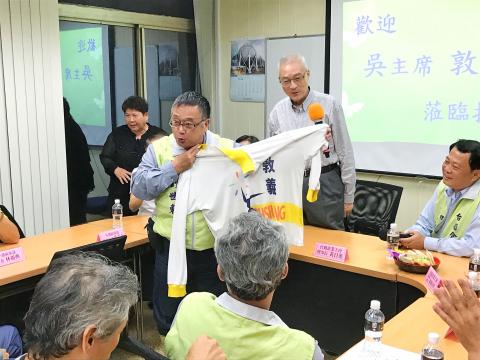The Chinese Nationalist Party (KMT) yesterday canceled its weekly Central Standing Committee (CSC) meeting reportedly due to a new wave of intraparty fighting between outgoing KMT Chairwoman Hung Hsiu-chu (洪秀柱) and chairman-elect Wu Den-yih (吳敦義) over the right to nominate Central Committee members.
According to the party’s agenda, Central Committee members are to be nominated by Hung on June 14, with the election of party representatives and Central Standing Committee members to be held on July 7 and July 29 respectively.
This means that Wu, who is scheduled to assume the chairmanship on Aug. 20, when the party’s national congress is also to be held, will not be able to nominate candidates for the elections.

Photo: Hung Chen-hung, Taipei Times
Sources said Wu was planning to raise the issue during the committee meeting yesterday in a bid to secure nominating rights.
Hung responded by canceling the meeting.
A source from Hung’s faction yesterday accused Wu of attempting to “wipe out” her camp.
The alleged infighting occurred despite a written pledge by the six candidates for the chairperson election last month to promote party and to rebuild the pan-blue camp.
A source from KMT headquarters yesterday presented minutes taken during past Central Standing Committee meetings showing that the upcoming elections have been organized in the same manner as the previous two elections, in which the party chief nominated the candidates.
In response to remarks by more than 20 CSC members that the election rules breached the KMT’s charter and that they would take the issue to a court, the source said that could be a solution, but it would damage the party’s public image.
However, considering that a majority of the CSC members oppose Hung, it is unlikely that the her camp would be able to stop changes to the election rules during the committee’s meeting on Wednesday next week, the source said.
KMT Legislator Lee Yen-hsiu (李彥秀) said that Hung’s postponement of yesterday’s meeting because she was afraid of losing her nomination rights has made the party a joke.
Comparing the issue to “domestic affairs,” she said that it could be resolved by facilitating communication.
KMT Legislator Johnny Chiang (江啟臣) said that many items in the run-up to the chairperson handover needed coordination and that procedural issues should be addressed.
The party should demonstrate unity so that its would not be compromised by its adversaries in a period of challenges, he said.
Meanwhile, Wu has been faced with the first conundrum since his election — making up for a NT$10 million (US$332,204) shortage in this month’s salary payments to party employees.
Additional reporting by Shih Hsio-kuang

INVESTIGATION: The case is the latest instance of a DPP figure being implicated in an espionage network accused of allegedly leaking information to Chinese intelligence Democratic Progressive Party (DPP) member Ho Jen-chieh (何仁傑) was detained and held incommunicado yesterday on suspicion of spying for China during his tenure as assistant to then-minister of foreign affairs Joseph Wu (吳釗燮). The Taipei District Prosecutors’ Office said Ho was implicated during its investigation into alleged spying activities by former Presidential Office consultant Wu Shang-yu (吳尚雨). Prosecutors said there is reason to believe Ho breached the National Security Act (國家安全法) by leaking classified Ministry of Foreign Affairs information to Chinese intelligence. Following interrogation, prosecutors petitioned the Taipei District Court to detain Ho, citing concerns over potential collusion or tampering of evidence. The

‘FORM OF PROTEST’: The German Institute Taipei said it was ‘shocked’ to see Nazi symbolism used in connection with political aims as it condemned the incident Sung Chien-liang (宋建樑), who led efforts to recall Democratic Progressive Party (DPP) Legislator Lee Kun-cheng (李坤城), was released on bail of NT$80,000 yesterday amid an outcry over a Nazi armband he wore to questioning the night before. Sung arrived at the New Taipei City District Prosecutors’ Office for questioning in a recall petition forgery case on Tuesday night wearing a red armband bearing a swastika, carrying a copy of Adolf Hitler’s Mein Kampf and giving a Nazi salute. Sung left the building at 1:15am without the armband and apparently covering the book with a coat. This is a serious international scandal and Chinese

Seventy percent of middle and elementary schools now conduct English classes entirely in English, the Ministry of Education said, as it encourages schools nationwide to adopt this practice Minister of Education (MOE) Cheng Ying-yao (鄭英耀) is scheduled to present a report on the government’s bilingual education policy to the Legislative Yuan’s Education and Culture Committee today. The report would outline strategies aimed at expanding access to education, reducing regional disparities and improving talent cultivation. Implementation of bilingual education policies has varied across local governments, occasionally drawing public criticism. For example, some schools have required teachers of non-English subjects to pass English proficiency

TRADE: The premier pledged safeguards on ‘Made in Taiwan’ labeling, anti-dumping measures and stricter export controls to strengthen its position in trade talks Products labeled “made in Taiwan” must be genuinely made in Taiwan, Premier Cho Jung-tai (卓榮泰) said yesterday, vowing to enforce strict safeguards against “origin laundering” and initiate anti-dumping investigations to prevent China dumping its products in Taiwan. Cho made the remarks in a discussion session with representatives from industries in Kaohsiung. In response to the US government’s recent announcement of “reciprocal” tariffs on its trading partners, President William Lai (賴清德) and Cho last week began a series of consultations with industry leaders nationwide to gather feedback and address concerns. Taiwanese and US officials held a videoconference on Friday evening to discuss the